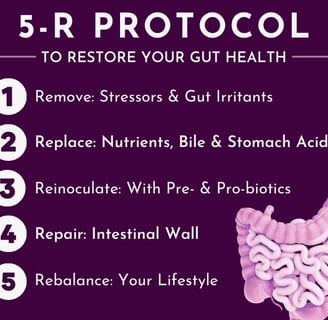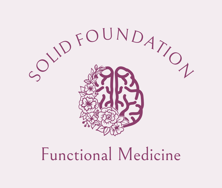The Gut-Brain Axis: The Emerging Link Between Gut Microbes and Mental Health
Is your gut microbiome changing the way your brain works?
Chelsey Rozeboom RN, FMNS
1/6/20253 min read


The gut-brain axis is a relatively new concept, and not all healthcare providers are yet acknowledging its critical role in mental health. But the research is growing, and the connection between your gut microbes and the brain is becoming clearer with each new study. While we're just beginning to scratch the surface, here's what we know so far—and why it might be affecting you more than you think.
Gut Microbes and Neurotransmitter Production
Our gut is more than just a digestive powerhouse; it also plays an essential role in the production and regulation of neurotransmitters like dopamine and serotonin. These chemicals are crucial for mood regulation, emotional well-being, and mental clarity. But here's the catch: certain species of gut bacteria can disrupt this process, either by overproducing or underproducing these important molecules, leading to mental health issues like anxiety and depression.
For instance, Lactobacillus and Bifidobacterium species are known to support the production of serotonin, often referred to as the “feel-good” neurotransmitter. However, when there is an imbalance of gut bacteria—commonly referred to as "dysbiosis"—it can interfere with this production. This disruption can potentially lead to symptoms of depression, anxiety, or even more severe mental health disorders.
The Link Between Gut Bacteria and Anxiety
One of the most fascinating aspects of this emerging research involves the relationship between gut health and anxiety. Clinical studies have shown that individuals with anxiety disorders—such as Generalized Anxiety Disorder (GAD)—often have lower levels of gut bacteria and a lower diversity of microbial species. This suggests that a less diverse microbiome may be a contributing factor to anxiety.
The silver lining? Adding healthy gut flora—via probiotics, for instance—could potentially help restore balance and reduce anxiety levels. Unlike traditional anxiety treatments such as SSRI medications, which often come with side effects, probiotics are natural, generally well-tolerated, and have little to no known adverse effects. This offers an exciting possibility for those looking for a more holistic way to address anxiety.
Gut Microbes and Depression: The Role of H. Pylori
When it comes to depression, the gut-brain connection is just as significant. A notable finding from some studies is the relationship between an overgrowth of Helicobacter pylori (H. pylori) bacteria and increased symptoms of depression, especially in women. H. pylori is a common bacterium that normally resides in the stomach and is often harmless in small quantities. However, when it overgrows, it can lead to digestive disturbances, ulcers, and even more serious gastrointestinal issues.
What’s surprising is that this overgrowth also correlates with heightened symptoms of depression, creating a vicious cycle: an imbalanced gut leads to mood disturbances, and those mood disturbances may exacerbate gastrointestinal issues. This bi-directional relationship between gut and brain highlights the importance of addressing gut health as part of a broader mental health treatment plan.
A Functional Medicine Approach to Gut Health and Mental Wellness
If you’re struggling with mental health issues like anxiety, depression, bipolar disorder, or even schizophrenia, the gut microbiome could be playing a significant role. A functional medicine approach focuses on addressing root causes rather than just masking symptoms. One of the best ways to assess your gut health is through a comprehensive test like the GI-MAP (Gastrointestinal Microbial Assay Plus), a simple, non-invasive stool test that helps identify microbial imbalances in your gut. This test is highly accurate and can pinpoint specific bacteria or pathogens that may be contributing to your symptoms.
Once gut imbalances are identified, a functional medicine practitioner will guide you through a personalized treatment plan, often following the 5 Rs protocol:
Remove: Identify and eliminate triggers such as harmful bacteria, yeast overgrowth, and food sensitivities.
Replace: Support the digestive process by replacing key digestive enzymes, bile, or stomach acid that may be lacking.
Reinoculate: Introduce beneficial bacteria through probiotics and fermented foods to restore microbial diversity.
Repair: Heal any damage done to the gut lining—such as "leaky gut"—with supplements like L-glutamine and collagen.
Rebalance: Support overall body health and mental well-being by focusing on lifestyle changes like stress reduction, exercise, and sleep optimization.
This comprehensive approach aims not just to fix the gut, but to support the body and brain holistically. By focusing on the gut microbiome, you’re addressing the root causes of mental health imbalances, which could lead to lasting improvements in both mood and mental clarity.
Final Thoughts: A New Path for Mental Health
The gut-brain axis is an exciting and groundbreaking area of research, and it may just hold the key to a more holistic approach to managing mental health issues like anxiety and depression. While more studies are needed to fully understand the scope of the connection, it's clear that the health of your gut is deeply intertwined with the health of your mind.
If you suspect that your gut health may be contributing to your mental health struggles, a functional medicine approach can provide a path forward—offering personalized, science-backed treatments that address the root cause of the issue. A simple stool test like the GI-MAP, combined with the 5 Rs, could be the first step toward restoring balance in both your gut and your mind.
Source: https://pmc.ncbi.nlm.nih.gov/articles/PMC10384867/
If you're ready to take a deeper dive into how your gut health might be affecting your mental well-being, set up a free consultation call today.
Wellness
Take control of your health today.
Claims not verified by the FDA, and does not constitute as medical advice.
Healing
Consultation
sffunctionalmed@gmail.com
© 2024. All rights reserved.
